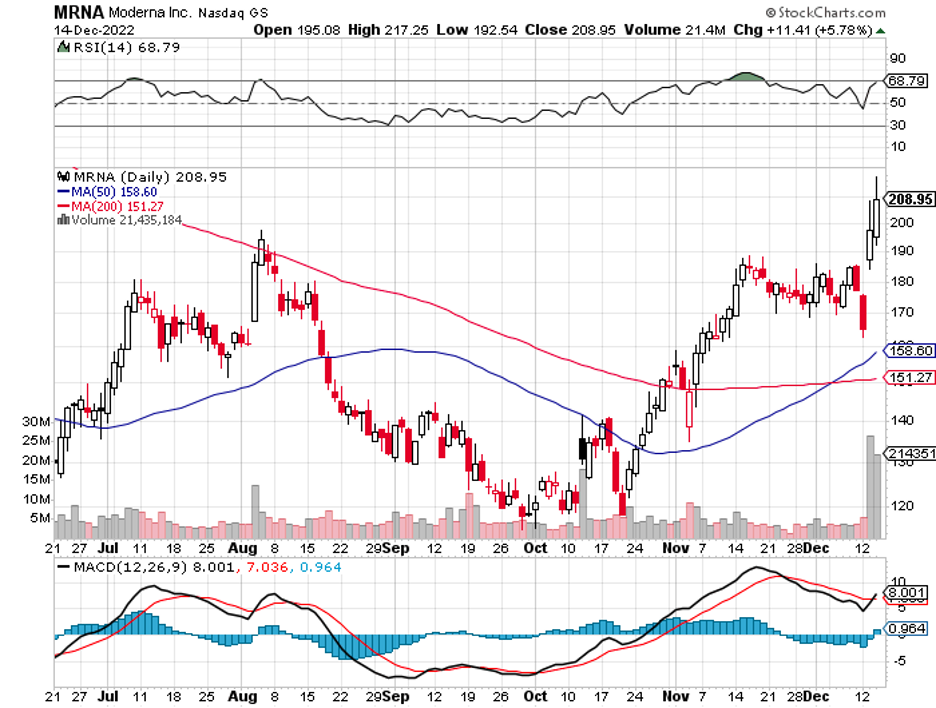Haste Makes Waste
Many quality stocks are experiencing annual declines. The bear market has heavily and negatively affected investor sentiment and, of course, the economic climate, which hurt earnings. Nonetheless, some stocks still managed to show signs of a rebound this year.
In the biotechnology and healthcare market, Moderna (MRNA) is putting up a pretty impressive fight to bounce back. In fact, it has posted a double-digit increase over the last three months. As this biotech gains more traction, it’s reasonable to wonder if it’s time to get in on it before 2023.
The latest update that pushed the stock higher was about the company’s cancer vaccine, which it has been working on with Merck (MRK).
Based on Phase 2 trial results, adding the experimental messenger RNA-based cancer vaccine of Moderna, called mRNA-4157, to the standard Keytruda treatment of Merck and administering the combination to high-risk melanoma patients lowered the risk of death or the recurrence of cancer by 44%.
Suppose this momentum is sustained until Phase 3 in the same category of patients, as well as in similar trials expected in other indications. In that case, this could signify the beginning of a monumental shift in cancer therapies. That is, it would create a market for mRNA-based personalized cancer vaccines that can be administered in combination with readily available treatments like Keytruda.
The results, which showed a decrease in the risk of relapse or death by almost half, also demonstrate a notable vindication for Moderna and represent a significant step towards realizing its ambitions to expand and diversify its profile as a COVID-19 vaccine maker.
This collaboration between Moderna and Merck on personalized cancer vaccines dates back to 2016, with the latter exercising its option to co-develop mRNA-4157 in October 2022.
Basically, mRNA-4157 is a tailored approach based on every patient’s specific tumor. According to Moderna, the procedure typically only takes a few weeks to complete. The idea behind adding Keytruda is rooted in boosting the immune response of the patient’s T-cells, while mRNA-4157 guides the T-cells to the specific tumor.
Apart from the proteins included in the personalized cancer vaccine, mRNA-4157 is actually identical to the COVID-19 vaccine distributed by Moderna across the globe. Both have the same mRNA chemistry, same lipid, same intramuscular route, and same manufacturing process.
If this treatment shows conclusive evidence that it can work on melanoma patients, then Moderna and Merck can expand their application to other indications. After all, Keytruda has several approvals under its belt, making it convenient for both companies to keep testing the combination.
To date, Moderna has fallen by roughly 30%. However, it has managed to bounce back by over 20% in the past three months. While the broader market downturn definitely hurt Moderna shares, another primary reason for its decline is the concern over its post-pandemic performance.
Realistically speaking, vaccine sales will likely not surpass the approximately $18 billion that Moderna recorded in 2021 and expects this year. Still, revenue will probably remain within the blockbuster territory.
Looking at the demand, the coronavirus booster market is projected to follow in the footsteps of the flu vaccine sector.
For context, the flu market worldwide reaches 500 million to 600 million doses yearly. Depending on the pricing, this demand could rake in somewhere between $12 billion to $24 billion.
On top of these, Moderna has been working on two additional candidates in Phase 3 trials: vaccines for the flu and respiratory syncytial virus. Both are anticipated to hit commercialization by 2024 and 2025.
Overall, Moderna could become an overwhelming success with its mRNA candidates in the years to come. However, the most challenging question is still estimating the company’s earnings for the next five years or more.
There remain notable uncertainties surrounding its pipeline. While I could always take a stab at estimating its profits, that’s just guesswork at this point. So despite Moderna’s impressive results over its personalized cancer vaccine program, I don’t think it’s a safe bet—for now.


